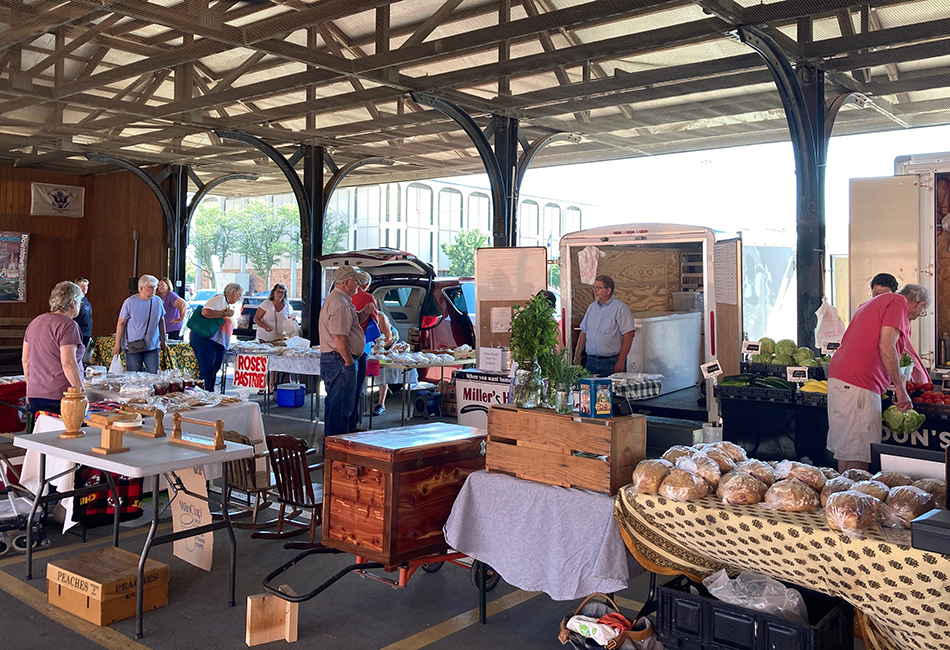Discover Resources
Welcome to our resources page for farmers’ markets! Not finding what you’re looking for? Don’t hesitate to reach out to us at farmersmarkets@ks.gov

Interested in organizing a farmers' market?
View the Kansas Department of Agriculture (KDA) checklist to help guide you through the various resources and requirements for opening and operating a typical Kansas farmers' market. This guide is designed to assist you as you work to build and operate a successful farmers' market in Kansas.
During the 2013 legislative session, Governor Brownback signed K.S.A. 2-3801 et seq., the Farmers' Market Promotion Act, to establish a central registration of farmers’ markets, which limits the legal liability of registered farmers’ markets (see "Insurance" section). Registered farmers’ markets will have access to marketing, outreach and advocacy efforts through From the Land of Kansas. Pursuant K.S.A. 2-3801 et seq., From the Land of Kansas will host the official Central Registration of Kansas Farmers’ Markets.
When a farmers’ market is registered with the Kansas Central Registration of Farmers’ Markets, the farmers’ market manager is subject to limited liability except in regards to intentional acts or dangerous conditions that the manager withholds information about. This means that, in most cases, registered farmers’ market participants (vendors and customers) assume the risk of being injured at or because of an action related to the farmers’ market. This applies only to the farmers’ market manager, not to individual vendors who may wish to seek individual product liability insurance.
Read more about the Farmers' Market Promotion Act here.
One available resource for farmers' market vendors is the National Farmers' Market Coalition. The National Farmers' Market Coalition worked with Campbell Risk Management to create an affordable liability insurance program available to farmers' market vendors at the national level.
Many farmers' market vendors may also sell their product at an on-farm store in an agritourism setting. Farms can have a general farm liability policy or they can have similar benefits through the Agritourism promotion act registration through Kansas Tourism.
Farmers' Market Promotional Flyer - Customizable for your market
Promote purchases at your farmers' market with recipe cards designed specifically for produce items typically found at farmers' markets! Find over 35 recipe cards and other marketing resources on our Farmers' Market Online Toolkit Page.
The USDA Supplemental Nutrition Assistance Program works with voluntary farmers' markets to create Electronic Benefit Transfer (EBT) Programs. The number of farmers' markets licensed to accept SNAP benefits is increasing nationwide. Click here to view farmers’ markets accepting SNAP benefits.
For USDA resources on how to start a SNAP program at a farmers’ market visit the USDA webpage to find SNAP training resources and a list of FAQs. Access the online application here. For information on Electronic Benefits Transfer (EBT), please check the USDA page on EBT. For more information regarding EBT, reach out to Kansas' EBT Manager, Larry McGillivary at (785) 296-4757 or larry.mcgillivary@dcf.ks.gov.
The Food Safety for Kansas Farmers Markets and other Direct-to-Consumer Sales: Regulations and Best Practices document has been updated as of January 2024. Download a digital copy of this from the K-State Research and Extension Bookstore. Contact fromthelandofkansas@ks.gov for a print copy. Printed copies are limited.
The Kansas Department of Agriculture offers a wide variety of tools and information available for food businesses in Kansas. These licensing guides offer many tools and direction for food entrepreneurs. Additional information about food sales at farmers’ markets can be found here. The sale of non-potentially hazardous foods is allowed at farmers' markets. Non-potentially hazardous foods include baked goods, such as cookies, breads, cakes, cinnamon rolls and fruit pies. Other non-potentially hazardous foods include fresh fruits, vegetables, nuts and honey.
For inquiries if a product can or cannot be sold at a market without a license from the Kansas Department of Agriculture, please contact to fsl@ks.gov, or contact the Food Safety & Lodging Inspection program at (785) 564-6767.
Other resources regarding food safety:
- Kansas Value Added Food Lab - View Introduction Video Here
- Food Labeling for Kansas Food Producers and Processors
- SPANISH Food Labeling for Kansas Food Producers and Processors
- Food Safety for Kansas Farmers' Markets and Direct-to-Consumer Sales: Regulations and Best Practices
- SPANISH Food Safety for Kansas Farmers Market Vendors: Regulations and Best Practices
- Sampling Safely at Kansas Farmers' Markets, Farm Stands, and Related Events
- SPANISH Sampling Safely at Kansas Farmers Markets, Farm Stands, and Related Events
- Selling Safe Canned Foods in Kansas
Rapid Market Assessments (RMAs) are a valuable tool in determining the impact of farmers' markets and local agriculture on municipal and county economies. Developed by Larry Lev, Linda Brewer and Garry Stephenson of Oregon State University, a RMA is an easy, effective and thorough means for gaining quality market research about your farmers' market.
By conducting a RMA, you can learn about consumer motivations, identify the total volume of market traffic, determine how much consumers spend and are willing to spend at the market and surrounding business, as well as a reliable estimate of market day sales. You can also customize your assessment to fit the information needs of your market.
Use the resources below to learn how to conduct a Rapid Market Assessment or Dot Survey at your market
Food Sales Tax Rate Reduction - Pub. KS-1223: This publication has been prepared by the Kansas Department of Revenue (KDOR) to assist you in understanding how Kansas sales and use tax applies to the retail food industry. Effective January 1, 2023, the state sales tax rate for food and food ingredients, and certain prepared food, will be reduced. In this publication you will find information on what is taxable at the full sales tax rate, what qualifies for the reduced sales tax rate, and other information of general interest to businesses. Their goal is to make collecting and paying sales tax as easy as possible and to help you avoid costly mistakes.